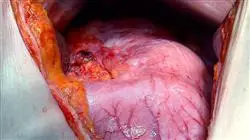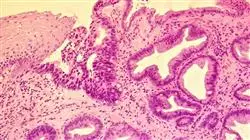University certificate
The world's largest faculty of medicine”
Introduction to the Program
Early detection, more efficient surgery and more precise treatment have enabled this progress”

Whereas a few years ago the survival of metastatic patients was around six months, it has now extended to at least 24 months, as a result of the fact that in recent years there have been many important advances in early detection, diagnosis and treatment procedures, so that at the same time, we are faced with increasing complexity in the management of these tumors.
The continuous improvement and sophistication of imaging methods, the refinement of some surgical techniques, the increased hierarchization of certain pathological findings, the inclusion of molecular biology in clinical practice, the incorporation of personalized medicine, changes in many classical therapeutic approaches, technological advances for the administration of radiotherapy, the incorporation of immunotherapy and new combined modalities, new complications and sequelae of new treatments, are some of the factors that make the care of patients with digestive tumors an increasingly complex activity.
This Postgraduate certificate in Tumors of the Upper Digestive Tract contains the most complete and up-to-date scientific program on the market”
This Postgraduate certificate in Tumors of the Upper Digestive Tract contains the most complete and updated scientific program on the market. The most important features of the University Course are:
- Clinical cases presented by experts in the different specialties. The graphic, schematic, and eminently practical contents with which they are created provide scientific and practical information on the disciplines that are essential for professional
- New developments in the diagnosis and treatment of digestive tumors
- An algorithm-based interactive learning system for decision-making in the clinical situations presented throughout the course
- With special emphasis on evidence-based medicine and research methodologies in the diagnosis and treatment of tumors of the upper gastrointestinal tract
- All of this will be complemented by theoretical lessons, questions to the expert, debate forums on controversial topics, and individual reflection assignments
- Content that is accessible from any fixed or portable device with an Internet connection
This Postgraduate certificate may be the best investment you can make when choosing a refresher program for two reasons: in addition to updating your knowledge in the Tumors of the Upper Digestive Tract, you will obtain a postgraduate certificate from Tumors of the Upper Digestive Tract"
Forming part of the teaching staff is a group of professionals in the world of digestive oncology who bring to this training their work experience, as well as a group of renowned specialists, recognised by esteemed scientific communities.
The multimedia content developed with the latest educational technology will provide the professional with situated and contextual learning, i.e., a simulated environment that will provide immersive training program to train in real situations.
Problem-Based Learning underpins this program design, and the doctor must use it to try and solve the different professional practice situations that arise throughout the course. For this reason, you will be assisted by an innovative, interactive video system created by renowned and experienced experts in the field of Tumors of the Upper Digestive Tract Tract with extensive teaching experience.
Increase your decision-making confidence by updating your knowledge through this Postgraduate certificate in Tumors of the Upper Digestive Tract"

Don't miss the opportunity to update your knowledge in Tumors of the upper gastrointestinal tract to improve patient care"
Why study at TECH?
TECH is the world’s largest online university. With an impressive catalog of more than 14,000 university programs available in 11 languages, it is positioned as a leader in employability, with a 99% job placement rate. In addition, it relies on an enormous faculty of more than 6,000 professors of the highest international renown.

Study at the world's largest online university and guarantee your professional success. The future starts at TECH”
The world’s best online university according to FORBES
The prestigious Forbes magazine, specialized in business and finance, has highlighted TECH as “the world's best online university” This is what they have recently stated in an article in their digital edition in which they echo the success story of this institution, “thanks to the academic offer it provides, the selection of its teaching staff, and an innovative learning method aimed at educating the professionals of the future”
A revolutionary study method, a cutting-edge faculty and a practical focus: the key to TECH's success.
The most complete study plans on the university scene
TECH offers the most complete study plans on the university scene, with syllabuses that cover fundamental concepts and, at the same time, the main scientific advances in their specific scientific areas. In addition, these programs are continuously being updated to guarantee students the academic vanguard and the most in-demand professional skills. In this way, the university's qualifications provide its graduates with a significant advantage to propel their careers to success.
TECH offers the most comprehensive and intensive study plans on the current university scene.
A world-class teaching staff
TECH's teaching staff is made up of more than 6,000 professors with the highest international recognition. Professors, researchers and top executives of multinational companies, including Isaiah Covington, performance coach of the Boston Celtics; Magda Romanska, principal investigator at Harvard MetaLAB; Ignacio Wistumba, chairman of the department of translational molecular pathology at MD Anderson Cancer Center; and D.W. Pine, creative director of TIME magazine, among others.
Internationally renowned experts, specialized in different branches of Health, Technology, Communication and Business, form part of the TECH faculty.
A unique learning method
TECH is the first university to use Relearning in all its programs. It is the best online learning methodology, accredited with international teaching quality certifications, provided by prestigious educational agencies. In addition, this disruptive educational model is complemented with the “Case Method”, thereby setting up a unique online teaching strategy. Innovative teaching resources are also implemented, including detailed videos, infographics and interactive summaries.
TECH combines Relearning and the Case Method in all its university programs to guarantee excellent theoretical and practical learning, studying whenever and wherever you want.
The world's largest online university
TECH is the world’s largest online university. We are the largest educational institution, with the best and widest online educational catalog, one hundred percent online and covering the vast majority of areas of knowledge. We offer a large selection of our own degrees and accredited online undergraduate and postgraduate degrees. In total, more than 14,000 university degrees, in eleven different languages, make us the largest educational largest in the world.
TECH has the world's most extensive catalog of academic and official programs, available in more than 11 languages.
Google Premier Partner
The American technology giant has awarded TECH the Google Google Premier Partner badge. This award, which is only available to 3% of the world's companies, highlights the efficient, flexible and tailored experience that this university provides to students. The recognition as a Google Premier Partner not only accredits the maximum rigor, performance and investment in TECH's digital infrastructures, but also places this university as one of the world's leading technology companies.
Google has positioned TECH in the top 3% of the world's most important technology companies by awarding it its Google Premier Partner badge.
The official online university of the NBA
TECH is the official online university of the NBA. Thanks to our agreement with the biggest league in basketball, we offer our students exclusive university programs, as well as a wide variety of educational resources focused on the business of the league and other areas of the sports industry. Each program is made up of a uniquely designed syllabus and features exceptional guest hosts: professionals with a distinguished sports background who will offer their expertise on the most relevant topics.
TECH has been selected by the NBA, the world's top basketball league, as its official online university.
The top-rated university by its students
Students have positioned TECH as the world's top-rated university on the main review websites, with a highest rating of 4.9 out of 5, obtained from more than 1,000 reviews. These results consolidate TECH as the benchmark university institution at an international level, reflecting the excellence and positive impact of its educational model.” reflecting the excellence and positive impact of its educational model.”
TECH is the world’s top-rated university by its students.
Leaders in employability
TECH has managed to become the leading university in employability. 99% of its students obtain jobs in the academic field they have studied, within one year of completing any of the university's programs. A similar number achieve immediate career enhancement. All this thanks to a study methodology that bases its effectiveness on the acquisition of practical skills, which are absolutely necessary for professional development.
99% of TECH graduates find a job within a year of completing their studies.
Postgraduate Certificate in Tumors of the Upper Digestive Tract
A few years ago, patients with metastases from digestive tumors used to live only 6 months, but thanks to advances in early detection, diagnosis and treatment, survival has now been extended to a minimum of 24 months. However, these advances have also increased the complexity in the management of these tumors, with the improvement and sophistication of imaging methods, refined surgical techniques, hierarchical pathological findings or molecular biology included in clinical practice. All this has made the care of patients with digestive tumors increasingly challenging, making this Postgraduate Certificate in Upper GI Tumors even more valuable.
Position yourself as an eminence in the approach to gastric cancer.
This Postgraduate Certificate in Tumors of the Upper Digestive Tract is the best opportunity to update the market to address the complex range of tumors of the Upper Digestive Tract, deepening in the treatment of gastric cancer, either in first or second line. In this sense, the student will only have to invest 225 hours to position himself as an expert in this area, which he will always do from home and with a catalog of academic resources at his disposal at any time of the day.







